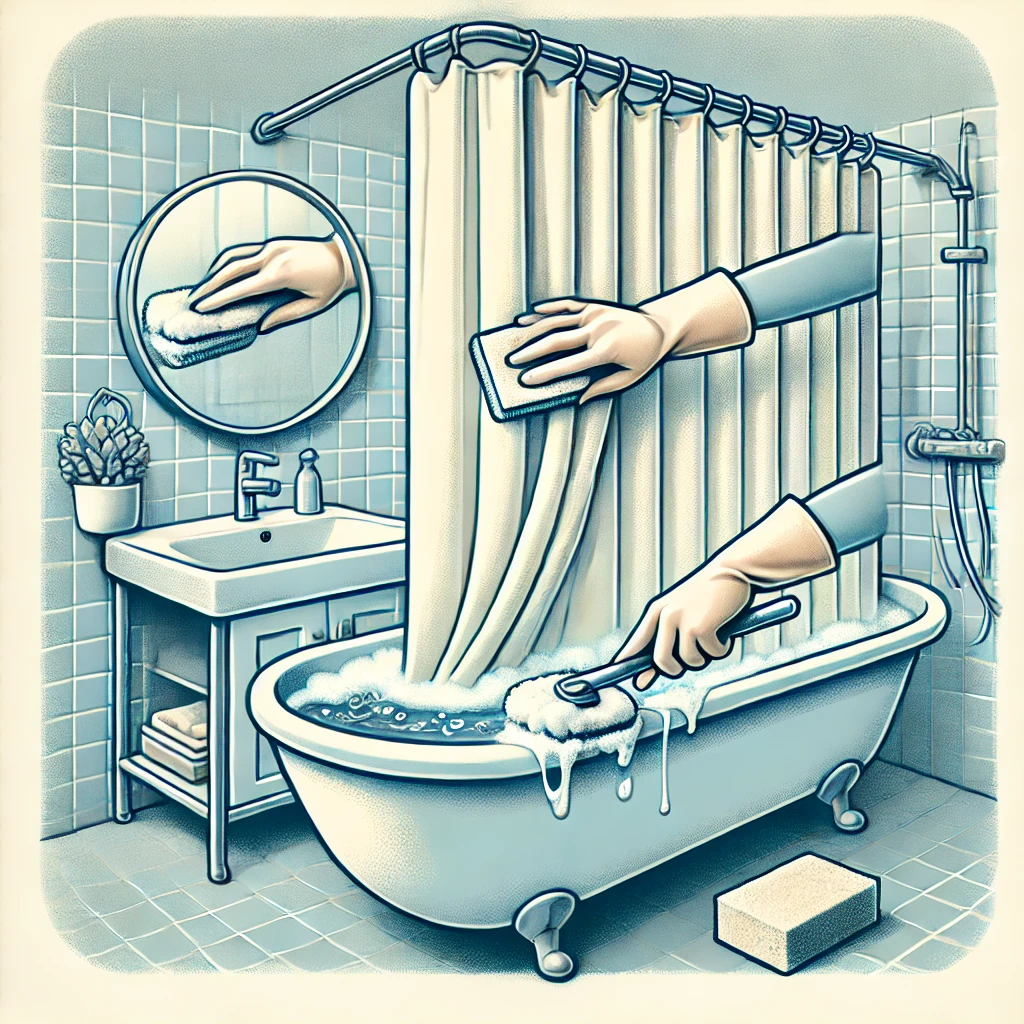Introduction
Shower curtains are a vital part of your bathroom, keeping water contained and your floors dry. However, like any fabric, they collect dirt, soap scum, and, unfortunately, mold and mildew. Cleaning your shower curtain regularly helps maintain a fresh, hygienic environment. The best part? You don’t have to remove it to clean it! Here’s how to clean and wash your shower curtain without taking it down.
Why Cleaning Shower Curtains Is Important
Shower curtains, especially those made of fabric, are prone to accumulating grime, soap residue, water stains, and mildew. Left uncleaned, they can become a breeding ground for bacteria, affecting the cleanliness of your entire bathroom. Regular cleaning not only improves the hygiene of your space but also extends the life of your curtain, ensuring it remains functional and attractive.
Benefits of Cleaning Without Removing the Curtain
While taking down the shower curtain may seem like the obvious solution, it’s not always convenient. Cleaning it while it’s still hanging saves time and energy, especially in smaller bathrooms where removing the curtain can be cumbersome. Plus, you avoid the hassle of needing a second person to help re-hang the curtain afterward.
How to Clean Shower Curtains Using a Washing Machine

Cleaning your shower curtain in the washing machine is one of the easiest and most efficient ways to refresh it. Here’s how:
Step-by-Step Guide:
- Place the Curtain in the Washing Machine
If the curtain is lightweight and machine washable, simply leave it hanging in the shower or bathtub. Pull the bottom of the curtain through and gather it into the washer. You may want to fold it neatly so it doesn’t get caught on anything. - Add Detergent
Use a mild laundry detergent or a special cleaner designed for bathroom fabrics. Avoid using fabric softeners, as they can leave residues that attract dirt. - Set the Washing Machine
Choose a gentle or delicate cycle with cold water to prevent any shrinkage or damage to the fabric. - Drying
Once the curtain is clean, it’s best to hang it back up in the shower to air-dry. Avoid using a dryer, as the heat can damage the fabric and affect the curtain’s shape.
Best Detergents to Use:
For the most effective cleaning, look for detergents that are mild but capable of breaking down soap scum and mildew. Alternatively, you can add half a cup of baking soda or white vinegar to the wash for extra deodorizing and stain-fighting power.
How to Clean Shower Curtains by Hand

If you prefer not to use a washing machine, or if your curtain is delicate, cleaning by hand is a great option.
Necessary Tools and Products:
- Mild laundry detergent
- Baking soda or vinegar
- A sponge or soft cloth
- A step ladder (for hard-to-reach areas)
Step-by-Step Guide:
- Prepare the Cleaning Solution
Mix a solution of warm water and a small amount of detergent. For mold and mildew removal, add some white vinegar or baking soda to the solution for added power. - Scrub the Curtain
Using a sponge or soft cloth, gently scrub the fabric in circular motions, starting from the top and working your way down. Pay extra attention to areas with visible stains or buildup. - Rinse
After scrubbing, use a handheld shower nozzle or a bucket of clean water to rinse the curtain thoroughly. Make sure all soap and detergent are washed away. - Drying
Hang the curtain back in the shower to air-dry. You can use a towel or microfiber cloth to gently wipe down excess water to speed up the drying process.
How to Clean a Moldy Shower Curtain
Identifying Mold on Shower Curtains:
Mold and mildew thrive in the damp, warm environment of the bathroom. If you notice dark spots, discoloration, or an unpleasant smell on your shower curtain, it’s likely due to mold or mildew growth.
How to Treat Mold and Mildew:
- Vinegar and Baking Soda:
Mix equal parts of white vinegar and water, then apply the solution to the affected areas. Let it sit for about 15–20 minutes. For stubborn mold, sprinkle baking soda on top of the vinegar solution and scrub gently with a sponge. - Bleach Solution (for White Curtains):
If your curtain is white and moldy, a bleach solution can help eliminate the mold. Mix one part bleach to three parts water and apply it to the moldy areas. Scrub gently with a brush or sponge, then rinse thoroughly. - Rinse and Dry:
Once the mold is removed, rinse the curtain thoroughly to ensure there’s no residual cleaning solution. Hang the curtain to dry in a well-ventilated area.
Preventing Future Mold Growth:
To prevent mold from coming back, make sure your shower curtain is always properly ventilated. Leave the curtain open after each shower to allow air circulation, and periodically wash it to keep it fresh.
Common Mistakes to Avoid When Cleaning Shower Curtains
Using Harsh Chemicals
Avoid using harsh chemicals like chlorine bleach on non-white shower curtains or delicate fabrics. These can weaken the material and cause damage over time.
Not Regularly Cleaning Your Shower Curtain
Neglecting your shower curtain can lead to the buildup of soap scum, grime, and mold, making it much harder to clean later on. Aim to clean your curtain at least once a month, depending on how often it’s used.
Conclusion
Cleaning your shower curtain doesn’t have to be a hassle or require taking it down. Whether you choose to clean it in the washing machine, by hand, or tackle stubborn mold, maintaining a clean shower curtain is simple with these methods. Regular cleaning will not only keep your bathroom looking fresh but also help extend the life of your curtain.
FAQ:
Can I use bleach to clean my shower curtain?
Yes, bleach can be effective for cleaning white curtains or for treating mold, but be sure to dilute it properly to avoid damaging the fabric.
How often should I clean my shower curtain?
It’s recommended to clean your shower curtain at least once a month, especially if you notice soap buildup or mold spots.
Is it safe to use a washing machine for all types of shower curtains?
Most fabric shower curtains are safe to clean in the washing machine, but always check the manufacturer’s instructions first. Delicate fabrics may require hand washing instead.
How do I prevent mold from growing on my shower curtain?
To prevent mold, ensure the curtain dries completely after each use and consider washing it regularly with a vinegar-based solution.
Can I wash my shower curtain with other laundry items?
It’s best to wash your shower curtain separately to avoid detergent buildup on other items and to prevent the curtain from snagging.

